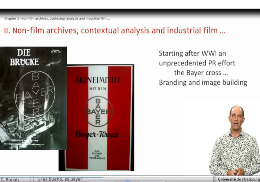
CICLO: Science and documentaries in the Twentieth century
Presentació del cicle: Science and documentaries in the Twentieth century
Data: 4 novembre de 2020 a les 18 hores
Enllaç a la presentació :
https://eu.bbcollab.com/guest/365493d93b094e6da28ef2900e50910f
Este ciclo está formado por tres conferencias asincrónicas que estarán disponibles para todas las personas interesadas durante la primera semana de noviembre en la web www.uv.es/ihmc. Las conferencias pueden ser consultadas junto con los documentales mencionados por parte de los conferenciantes que participan conjuntamente en una mesa redonda que tendrá lugar el día 25 de noviembre de 2020 a las 18 horas.
ENLACE A LA CONFERENCIA: https://cutt.ly/tgAgCEe
“Si es bueno, es Bayer”. Health education, corporate communication and the filmic image-building of German pharma industry as the world’s pharmacy”
Christian Bonah
Abstract
In many Latin and South American countries the slogan “Si es Bayer, es Bueno” has become a familiar, popular expression testifying to what corporations have tried to measure for a long time: spectator impact. Audio-visual communication has been at the forefront of promotional strategies for the German pharmaceutical giant Bayer ever since the 1920s when the corporation engaged with the concept of Wertwerbung, literally “value advertisement”. Promotional health education films participated strongly in corporate name, brand and image building. Building consumer trust in a company and its name was essential in a time when Bayer had lost many of its drug patents after WWI. The company established its own independent Filmstelle, a unit for film planning and production and developed and operated in the 1930s Bayer sound film trucks that toured remote areas throughout Germany, Europe and worldwide for public film shows. Building on recent scholarship in the field of industrial, sponsored, non-fiction and most recently utility film studies, the contribution will analyse how Bayer established its film production unit and its film production for a worldwide market in the 1920s and 1930s. Furthermore, we will ask how this corporate strategy played out to promote at the same time health education, modern German science and industry and the corporate brand behind the films.
Videos:
- In the service of humanity (Dir. W. Ruttmann, GER, 1938)
- In einer Stunde um die Welt [In one hour around the world] (Dir. J. Pinschewer, GER, 1931)
- Malaria (Dir. U. Kayser, GER, 1934)
Film screening is available at: https://medfilm.unistra.fr
Note: Medfilm has in principle an open access policy for higher education institutions and non-commercial educational use through Edugain (connect via SSO at the top right). If access should be blocked please contact us for assistance at: medfilm@unistra.fr
Christian Bonah
Es catedrático en el Département d’histoire et de philosophie des sciences de la vie et de la santé de la Université de Strasbourg. Ha estado muy activoen diversos ámbitos de la investigación en historia de la medicina y últimamente ha prestado especial atención al estudio de la historia del documental medico. Es uno de los coordinadores de la plataforma pedagògica Medfilm y ha sido co-editor del libro publicado en 2020 Body, Capital, and Screens. Visual Media and the Healthy Self in the 20th Century (Amsterdam University Press)









